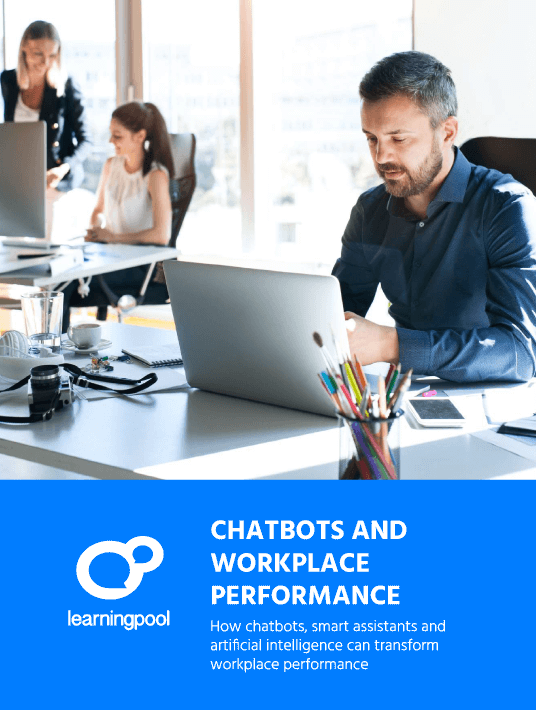Transforming Learning Support Using Artificial Intelligence (AI)
The importance of training has long been recognized, but the link between training and performance is often hard to quantify. Typically, training and learning at work have taken place away from the workplace. Training has been the preserve of the classroom.

Recently, classroom training may have been replaced or augmented by the digital content in a Learning Management System (LMS). In theory, the LMS makes learning more accessible and available. In practice, it’s often cumbersome and distant.
Then, there’s the uncomfortable, but verifiable, fact that we forget most of what we learn—and shortly after we learn it. The Ebbinghaus Effect, or the Forgetting Curve, was first identified in the 19th century, and we’ve made little progress since in overcoming it.
Job Aids
One effort to counter these limitations has been to provide job aids for employees. The primary focus of these paper-based quick reference guides or online FAQs is to break the cycle of learning and forgetting by bringing learning and information to employees in the workplace, where it’s most needed.
The big advantages of job aids are that they’re easily available, information is presented in digestible chunks, and it’s relevant and contextualized.
The disadvantages are that job aids are static. If the question isn’t there or asked correctly, the answer isn’t there, and there’s no other source to go to.
How AI Can Help
The concept of job aids raises the right question: how to make learning more relevant, effective, and available. But job aids only go so far in providing the answer. Add Artificial Intelligence, though, and you have the potential to offer a complete solution.
Think about the way you’d go about answering a question today. Where would you look? Chances are that you’d go to a search engine first. That might offer you a link to an article, an image, or a video. Or it might point you to a more refined engine: a travel planner or map app. Or you might find yourself directed to a set of instructions with diagrams on a wiki site or a video of an expert showing you how to do it on YouTube.
You can see at once the advantages over the tutor in the classroom, the course in the LMS, and the FAQs. Google offers a worldwide repository of information.
The Virtual Assistant
Yet, while it’s true that with Google and other apps available on mobile smart devices you’re never more than a few clicks or taps away from information, in general, you’re looking for a specific answer rather than all possible ones. Even more so, in the workplace where you’ve got a problem to solve in a limited timeframe and in a very particular context.
This is where the intelligence of AI makes a dramatic contribution to understanding your need and finding the specific answer you require. AI engines can process natural language, which means they can understand you and the way you communicate. In contrast to those static job aid FAQs, you can ask real questions and receive dynamic answers.
With AI virtual assistants, you enter a dialogue. This means that with every interaction, there’s a refinement of the Q&A process. And the assistant is learning with you, making the resulting answers more nuanced, refined, and personalized. This is not just knowledge for knowledge’s sake, but real learning with real answers to meet real needs.
Chatbots: A New Kind Of Job Aid
A new breed of AI assistants is coming to the fore: the chatbot. A chatbot is a computer program that engages the user in conversation, either through text or speech. The more advanced chatbots learn from each interaction or conversation, detecting preferences and making recommendations based on past requests.
Chatbots are being used in all sorts of ways from answering financial queries, giving customer support, diagnosing healthcare issues, and even offering counseling services. Forbes magazine called them our new best friend [1]. In fact, some bots are specifically designed to be a virtual friend [2].
Chatbots: Learning In The Workflow
Now, imagine the power of a chatbot at work. Instead of training being removed and learning resources being inaccessible—confined to the classroom, locked away in the LMS— it’s available at your desk, on your smart device, whenever you need it. The organization doesn’t even have to reconfigure its systems, as a chatbot can live within existing apps, platforms, and systems.
Chatbots harness the power of AI to provide learning at the point of need and just in time. This addresses the problem of forgetting because you can find out what you need to know when you need to know it.
More than that, with its ability to learn, a chatbot can be proactive, like any good mentor or trainer, anticipating what you need to know and even when you might need to know it. It gets to know you and your needs.
Improving The Quality Of Learning
Chatbots can not only address the problem of access, use, and retention of learning, they can also transform learning in the workplace in other ways. Chatbots intelligently query the learning that is available, and they present it in a form that is relevant and personal to the learner. But, do you remember the limitations of job aids? If a question isn’t anticipated, the answer isn't there.
With chatbots, we’re engaging in a dialogue; and dialogues are difficult, if not impossible, to script. Imagine that you ask a question that the chatbot can’t answer satisfactorily. It may seem you’ve learned nothing, but in fact, you’ve learned quite a lot, especially if you’re in Learning and Development.
Bots can keep a record of those interactions. Remember that they’re constantly learning too. If there’s a common question that keeps being asked to which the bot has no response, you learn at least 2 critical pieces of information: one, the answer isn’t there; and two, the question is a real one, highlighting a real work need.
This is the kind of evaluative feedback that learning models insist on but which is usually never available. Instead of anticipating or determining what they think employees ought to know, learning designers can respond to what employees decide that they need to know. The quality, relevance, and effectiveness of workplace learning improve accordingly.
Learning Transformed
With Artificial Intelligence giving us programs like chatbots, learning in the workplace can be transformed. Instead of seeing learning as a discrete activity, it can now be part and parcel of the everyday working environment.
Virtual assistants, like chatbots, deliver assistance and accessibility 24/7. The learning provided is more targeted, personalized, and relevant. With learning directed at the point of need, performance improves. The Holy Grail of workplace learning—just in time, at the point of need—is placed within reach.
Sources:
- The AI-Driven Digital Transformation Of Learning And Development
- That’s ‘Professor Bot’ to you! How AI is changing education
- Artificial Intelligence Will Change the Workplace Quicker Than We Think
- The impact of AI on employees and L&D
- Augmenting employee performance with AI and other technologies
- Forgetting curve
- 8 Examples of Artificial Intelligence (AI) in the Workplace
- Artificial Intelligence In Education: Don't Ignore It, Harness It!
- Why every worker needs a virtual assistant
- The Future Of Work: The Intersection Of Artificial Intelligence And Human Resources
Footnotes:








